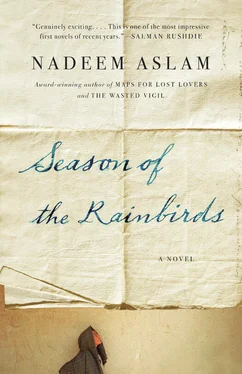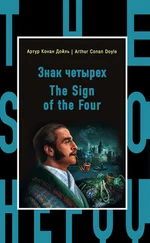Nadeem Aslam
Season of the Rainbirds
PRAISE FOR NADEEM ASLAM AND SEASON OF THE RAINBIRDS
“A model of compact unadorned storytelling.”
— The Observer (London)
“A real treat.”
— The Daily Telegraph (London)
“Aslam quietly captures his country’s oppressive past and the ferocity of its religious schisms.”
— The Independent (London)
“Aslam lovingly explores the daily rhythms and beauties of the Islamic life of his youth, while providing insight into the turbulent modern history of his native land.”
— Publishers Weekly
“Extraordinary.… Aslam has created a novel which — grave yet exultant, brutal but compassionate — achieves its complex humanity, and its final affirmations of love and beauty, through a real reckoning with despair and heartbreak.”
— Pankaj Mishra, The New York Review of Books
“Richly atmospheric … engagingly introspective.… Aslam reveals — artfully and heartbreakingly — a psychology at war with itself.”
— The New York Times Book Review
“Stylistically dazzling, full of poetic, richly descriptive and tender passages.… His characters’ inner lives are explored in-depth, flaws and all.… A novel as affecting as it is provocative.”
— Los Angeles Times Book Review
“A novel of extraordinary quality. Islamists would be foolish to try and make political mischief out of it, while western readers would be foolish to ignore such a carefully crafted work.”
— The Economist
“Aslam’s prose soars, dazzling images abound.… Through the opulence of his writing and the darkness of his message Aslam quite brilliantly and shockingly seduces his reader.… A tale that is both Shakespearean and horrifically topical.… Beautiful and only too real, this story born of romance and pain matches its artistry with courage. It is an important novel and also a very fine one.”
— The Irish Times
“Remarkable.… Rich and beautifully wrought.”
— The Boston Globe
“Aslam is a rich and vividly metaphorical writer.… This is an exquisitely sad novel, and it is worth the effort of letting its spell take you over.”
— Newsday
All characters in this novel are fictional; most of the events are, too. However:
— the terrorist attack mentioned in ‘Wednesday’ (chapter 7) is based on the first attempt on General Zia’s life: on 7 February 1982, the Al-Zulifiquar (the terrorist team led by Benazir Bhutto’s brother, Murtaza) fired a SAM-7 missile at a plane carrying the General.
— The Little Green Book containing the ‘President’s thoughts’, mentioned in ‘Thursday’ (chapter 8), did exist; it was commissioned by Ayub Khan during his rule (1958–69).

The quotations from the Qur’an in this book are from N.J. Dawood’s translation for the Penguin Classics series.
I am indebted to Tariq Ali for his excellent books on Pakistan, Pakistan: Military Rule or People’s Power? (Cape, 1970) and Can Pakistan Survive? (Penguin Books, 1983); the books provided social and political context for some of my childhood memories.
A glossary of Urdu words used in the novel will be found at the end of this book.
N.A.
MAULANA HAFEEZ
Aged cleric of one of the two mosques in the town.
MAULANA DAWOOD
Cleric of the other mosque.
JUDGE ANWAR
Powerful local figure.
ASGRI ANWAR
Judge Anwar’s wife and mother of his seven daughters.
AZHAR
Deputy Commissioner.
ELIZABETH MASSIH
Azhar’s Christian mistress.
BENJAMIN MASSIH
Roadsweeper. Elizabeth’s father.
MUJEEB ALI
Local landowner.
NABILA ALI
Mujeeb Ali’s wife and mother of his five daughters.
ARSHAD ALI
Mujeeb Ali’s youngest brother.
KALSUM
Widow receiving pension from Mujeeb Ali for death of son in political rally.
SURAYA
Kalsum’s sister on visit from Canada seeking divorce from husband Burkat.
YUSUF RAO
Lawyer and former political activist. Old university friend of Mr Kasmi.
MR KASMI
Retired schoolmaster.
ZÉBUN
Ex-courtesan. Mr Kasmi’s landlady.
ALICE
Zébun’s Christian servant girl.
ZAFRI
The butcher. Friend and confidant of Nabi, the barber.
MANSOOR
Close neighbour of Maulana Hafeez.
GUL-KALAM
Nightwatchman.
SAIF AZIZ
‘Metropolitan’ journalist and ex-political activist.
If I’d been told as a child what the life of an adult is like, I wouldn’t have believed it. I’d never have believed it could be so unfinished.
John Berger, Once in Europa
Fish .
The cook lifts the damp dark-red cloth to reveal a row of quicksilver fish, overlapping each other like fallen dominoes. Wherever we are, whatever we’re doing, we leave the blinding white light of the summer day for the gloom of the kitchen. The rumpled cloth has fallen to the floor. We hold our breaths as the cook picks up the serrated knife — the knife we are forbidden to sharpen pencils with. Could this be it? Our chins tickle as the tip of the knife is inserted below a fish’s mouth. Then the cook makes a rapid stem-to-stern tear and splits open our stomachs, pushes in two large fingers to uproot our guts and, without looking, hurls them into the bowl set beside her on the table. Still dizzy from the sunlight, we dip tentative fingers into the grisly mess and feel for shahzadi Mahar-un-Nisa’s diamond ring. No, this was not the fish that swallowed it. We wait for the next fish to be opened. Our fingertips are coated with pink tissue fluid .
But the cook asks us to leave; the knife is raised in the air — a gesture reminiscent of early April when we enter the kitchen to steal aambis. Then, a ladle — a triangular plume of sweetly scented vapour attached to it — might be raised in the air. The cook bears provocation patiently but doesn’t like us inside the kitchen. She doesn’t flinch from tasting half-cooked dishes to check if the salt was remembered. If she thinks something is worthless she calls it ‘the ash of seven ovens’. Not only is it worthless, there is also so much of it! We time our raids well: we sneak in when water is being added to the chaval. A specific number of glassfuls has to be added and the cook cannot turn around without breaking her concentration. She is tense as she counts: ‘… three … four, get away from there, five … six … you’ll make me, seven … lose track, eight … eight, eight … nine.’ Once free, she comes to the door and shouts across the courtyard, ‘You’ll all die of yarkan and I’ll get the blame. No more aambis.’
Men with black beards are to be avoided; while those with white beards are kind and gentle. We hide under the bed and, through the serpentine curves of the bobin lace, listen to Mother and Uncle Shujahat talk to each other in raised voices. Uncle Shujahat has a black beard; it reaches down to his navel. Mother says, ‘You’re using religion as an excuse to withdraw from the world. You’re running away from your responsibilities.’ Uncle Shujahat says, ‘We were not brought up to talk about God-prophet in this manner. If only Father-ji could hear you.’ Mother shouts back, ‘Father-ji was religious but he kept things in proportion. He even sent me, a girl, to Lahore to get a university degree. He didn’t mind my living away from home. And that was twenty years ago.’
Читать дальше













